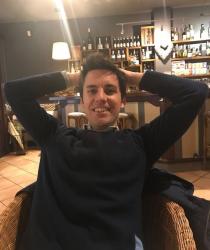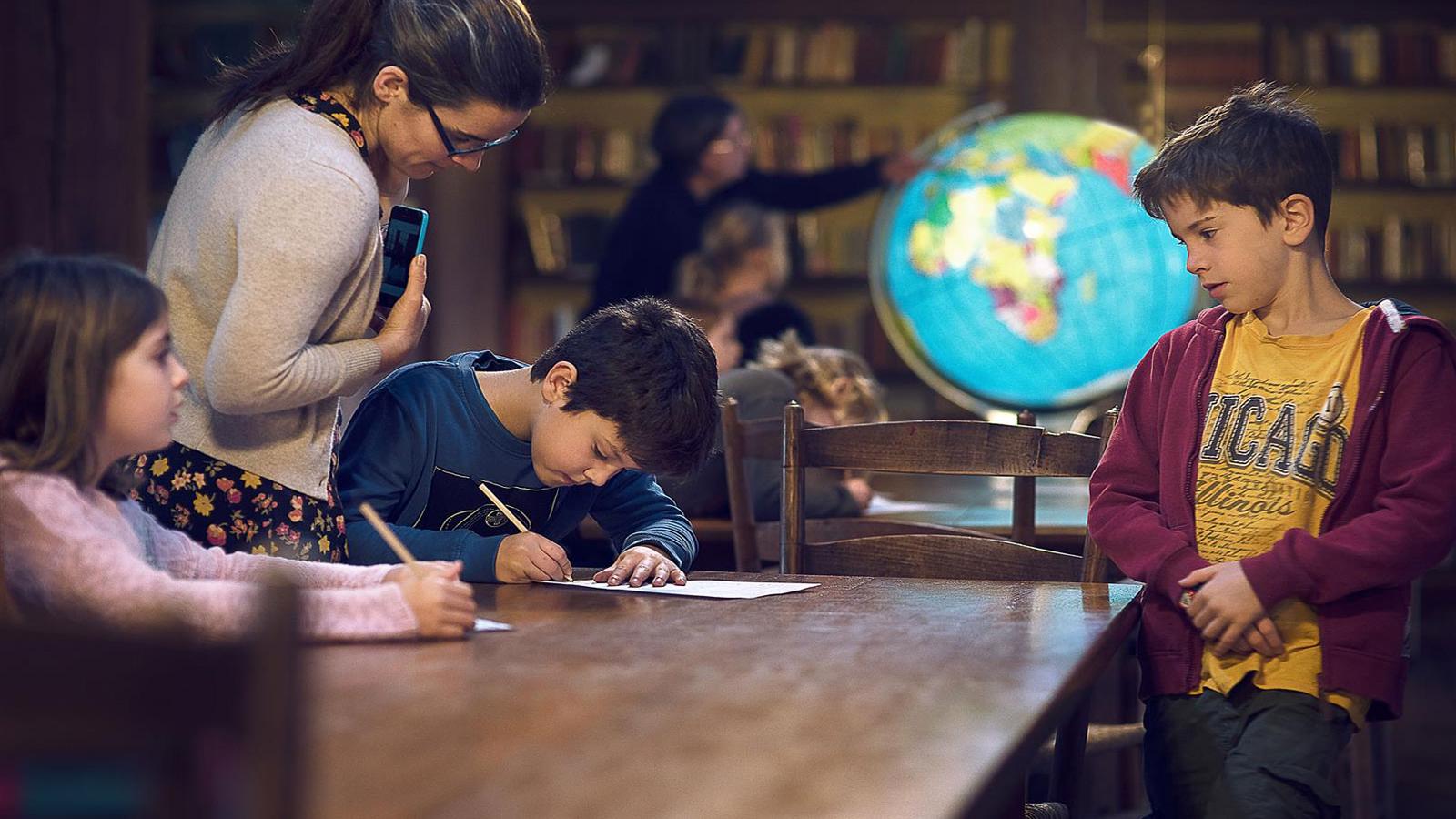
Rodger Abey-Parris has often wished that Bedales had entered his life somewhat earlier than it did. The son of a Spanish father and an English mother, he was born in the UK but was soon taken to Spain, where all his formative school days would be spent. “My parents moved around Catalonia quite a bit in those days,” he recalls. “My primary school years were spent at normal state schools and when we moved down the coast a bit, I was then sent to a small rural school where all ages were taught in the same class! That didn’t work for me – I really didn’t get on with the teacher – and at about the age of 12, I went to the only secondary school in our local town. I enjoyed it a lot more but I didn’t exactly shine at school; I was more interested in being a teenager and when I passed my exams, I did so without any great distinction.”
His mother accordingly decided that it was time for Rodger to try a completely different educational establishment. “My grandfather had been a cable engineer who moved round the world a lot, which meant that my mother was born in what is now Zimbabwe and spent her early life in Jamaica,” Rodger explains. “She and her brother were both then sent to Bedales. My uncle absolutely loved it and went all the way through but Mum, who could only fly back to Jamaica once a year, was so homesick that she eventually left after a couple of years. She always rather regretted that and she decided that Bedales might be the right place for me.”
Rodger’s father needed more convincing about the plan. “Dad wasn’t sold on the idea, partly because boarding schools in Spain are often regarded as places for wayward children, not as particularly great educational establishments,” he says. “The cost was the other issue he had, of course, so he asked a lot of questions about the whole thing but once he’d actually seen Bedales he became a lot happier about what the school might be able to do for me.”
Gradually, Bedales was helping me to feel less scared about moving out of my comfort zone
So it was that Rodger came over to base himself at his uncle’s house in England for his three-day introduction to Bedales. “I sat a test, I imagine, although I can’t really remember it,” he says. “I had been very happy in Spain and I wasn’t all that excited about moving just then but I do remember thinking how much I liked the rural setting of the school.”
By the time he had reached the second term of his year in 6.1 at Bedales, the school’s charms were beginning to have the desired positive effect on Rodger. “I started off quite excited, although rather homesick at the same time, but I was also a very shy person at that stage and I didn’t speak English as well as I do now,” he reflects. “I got straight into sport, as I would have done in Spain. There was football, of course, and I also swam and tried hockey, but I didn’t really push myself into the many other opportunities that were so freely available to Bedales students. Looking back, that’s something I would have done differently if I had my time again but in any case, when I returned to school after the Christmas holidays, I really started to enjoy myself.”
The unique relationship that teachers at Bedales have with their students was one important factor in this happy development. “I always saw members of staff as approachable and friendly, which really suited someone as reserved and less immediately comfortable with new stuff as I was,” says Rodger. “I began to regard Bedales as a big family – I remember my housemaster, Philip Parsons, being particularly good at making us feel at home, especially those of us who were left behind at school on the weekends. On the academic side, I was doing A-Levels in geography, Spanish, economics and business studies and Colin Prowse, my tutor and geography teacher, was another very influential and understanding figure in my school life. Gradually, Bedales was helping me to feel less scared about moving out of my comfort zone; I was even an extra in a couple of plays, once when the entire football team was made to get on stage and do a bit of acting!”
Leaving Bedales consequently came as a severe wrench to Rodger. “I don’t think that any of us wanted to go and for the first few weeks of my time at university, I missed the old Bedales atmosphere,” he admits. Rodger had taken a gap year before going up to Manchester University to study Economics, during which he had spent time working in an orphanage in India before heading back to Spain. Manchester, when he arrived there, was quite a culture shock for a young man more accustomed to a rural environment. “I guess that I was quite dull by comparison with some of my friends, who were going out the whole time,” he observes. “I did my bit of getting to know the Curry Mile and places like that as well but I was probably happiest quietly hanging out with my friends. Manchester was a very different place but I’m glad I went there and had the experience.”
I began to regard Bedales as a big family – I remember my housemaster, Philip Parsons, being particularly good at making us feel at home. On the academic side, Colin Prowse, my tutor and geography teacher, was another very influential and understanding figure in my school life
Both sides of Rodger’s family were blessed with an entrepreneurial streak that always made it likely that his destiny would ultimately be to join the family business, Abbey Metals, back in Spain. This revolves around lead sheet manufacturing; the company recycles lead and re-purposes it for use in fields as diverse as X-ray radiation protection, sound proofing and roofing for sale in overseas markets such as the UK and the Netherlands. “At least the recycling aspect of it is very Bedalian,” Rodger points out.
Meanwhile, another strand to the family business had emerged, even more Bedalian in its spirit, and Rodger was also overseeing a beef farm of 120 cows, located in a beautiful spot 100 km north of Barcelona. Over time he has turned this into an organic farm and endeavoured to create an environmentally, socially and economically sustainable local area. “The lead business has been a pretty tough one over the past decade or so with the global and Spanish economies having such a rocky time and the organic farm has been the really enjoyable side of things for me,” he admits. “I still regard myself as a businessman rather than a farmer, having said that. We bought the beef farm partly because we wanted to diversify into forestry but we’re also trialling something else at the moment – an organic mushroom business in partnership with a Dutch friend!”
As if this were not enough, Rodger has also played a leading part in the restoration and development of an old Catalan ‘masia’ (www.avenc.com), which opened for business as a hotel a few years ago. “The day-to-day running of the place, taking bookings and that kind of thing, is nothing to do with me,” he emphasises, “but I do keep an eye on its upkeep and maintenance and try to make the place as self-sufficient as possible with things like solar panels, a wind turbine, biomass boilers and so on. It’s a full schedule, for sure, but every day is different for me and that’s the way I like it.”
I feel pretty nostalgic when I think of those two years; they were the key to shaping the person that I’ve become
A man with Rodger’s family background and roots cannot help but be an interested, somewhat dismayed spectator at recent political events across Europe. The ongoing war of words over independence for Catalonia, for example, and the Spanish Government’s decision to impose direct rule over the region (financial control was recently returned to the regional government) has created an uncertainty that is distinctly unhelpful for those directly affected by it. “That drip-drip effect of bad news piled onto more bad news is definitely unsettling,” Rodger agrees. “I feel very Catalan but despite that, I don’t personally have a strong urge for independence, particularly now the old Government has been turned out of office. I’m not convinced that outright independence is necessarily the way to go – I feel sure that there’s a better way in which Spain and Catalonia can co-exist.”
If the question of Catalan self-determination leaves Rodger feeling uneasy, the recent decision by the UK to leave the European Union prompts feelings in him that stop little short of fury. “Brexit makes me so angry,” he says. “I feel as British as I do Catalan and I think it’s such a dangerous and depressing choice. It was also a huge surprise, which is almost the worst thing of all – I thought I knew the British well and it turns out that I simply don’t know them at all.”
Thinking about Britain inevitably nudges Rodger back to his days at Bedales and far happier recollections. “I feel pretty nostalgic when I think of those two years,” he says. “They were the key to shaping the person that I’ve become. My wife and I have recently had our first child, a boy, and we’re eventually hoping to move even deeper into the Catalan countryside but I shall always maintain my links with Britain, both through the business, and more importantly through my Old Bedalian mates, with whom I’m still very much in touch. Ten years from now, it would be lovely to think that we could send our son to Bedales in his turn.”
Rodger was interviewed by James Fairweather in June 2018
